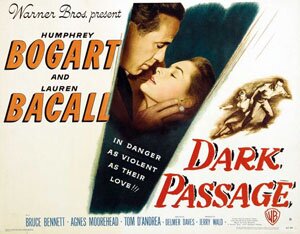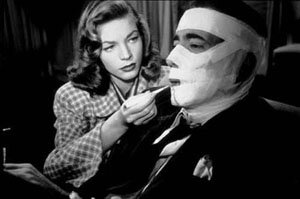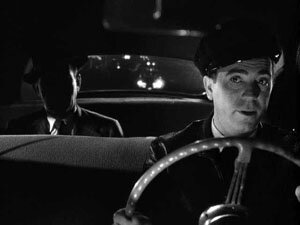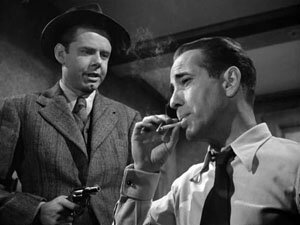It’s Day 6 of For the Love of Film (Noir) — don’t forget to or use the button on the right. And if you are interested in boatloads of great links to musings on film noir and its films, scroll down this page at Self-Styled Siren or over at Ferdy on Films. This is wonderful material!
As much as I like movies in the film noir category, particularly those from the forties and fifties, the term is not a synonym for good. As with any type of movie — screwball, romance, western, drama — it has its clunkers.
Of course, everything is subjective. As you’ll read below, I don’t have a high opinion of Dark Passage. Maybe the problem isn’t the movie but me. To be fair, there is this review over at Noir of the Week. As for mine …
 Dark Passage (1947)
Dark Passage (1947)
Directed by Delmer Daves
Of the four movies Humphrey Bogart and Lauren Bacall made together, Dark Passage is easily the weakest. (Their other movies together were To Have and Have Not, The Big Sleep, and Key Largo.) It’s a film noir that has what it thinks is a neat idea — the first third of the movie uses a “first-person” camera, meaning the central character is the camera viewpoint.
But it falls flat.
In fact, the gimmick pretty much ruins the film because we don’t get to see (and therefore connect with) Humphrey Bogart’s character. In the first third, we don’t see him period. He is the camera viewpoint. In the second third, his head is bandaged (due to plastic surgery to alter his identity).
We don’t actually see Bogie till a large chunk of the movie is over. By the time we do, we’re bored.
 Bogart plays a character wrongly accused and convicted of murder. The movie opens with his escape. On the run, he is rescued by Lauren Bacall’s character. (Everyone Bogart runs into in the movie conveniently has some connection to the story.)
Bogart plays a character wrongly accused and convicted of murder. The movie opens with his escape. On the run, he is rescued by Lauren Bacall’s character. (Everyone Bogart runs into in the movie conveniently has some connection to the story.)
A helpful cab driver later recommends a shady plastic surgeon to Bogart’s character. Bogart gets his face changed then goes off in search of the criminals who framed him so he can prove his innocence.
Despite trying, the movie never gets very interesting. For one thing, there is very little to relieve the darkness of the noir approach. There is also little chemistry between Bogart and Bacall and this is largely because they play so few scenes together, at least in the first two thirds.
The characters do have scenes, but since Bogart isn’t physically in them (because of the camera viewpoint or because his head is wrapped in bandages and he can’t talk), the Bogie-Bacall magic is absent.
 The other problem are the improbable conveniences mentioned above — the helpful cab driver, a guy who picks up Bogart when he is hitchhiking, Bacall’s appearance. It’s all a little too improbable.
The other problem are the improbable conveniences mentioned above — the helpful cab driver, a guy who picks up Bogart when he is hitchhiking, Bacall’s appearance. It’s all a little too improbable.
The only time we get a sense for an interesting story is at the very end when Bogart and Bacall have fled to South America. Suddenly the heavy handed noir atmosphere is relieved and we get something that has more of the atmosphere of Casablanca or To Have and Have Not.
It seems clear that the movie has misread what made Bogart and Bacall so interesting together. It certainly misreads Bogart.
 Despite the success of movies like The Big Sleep and The Maltese Falcon, it wasn’t the noir genre that made Bogart popular. It was that he was playing a flawed romantic hero within them.
Despite the success of movies like The Big Sleep and The Maltese Falcon, it wasn’t the noir genre that made Bogart popular. It was that he was playing a flawed romantic hero within them.
In Dark Passage he simply plays a schmuck floundering around trying to prove his innocence. He doesn’t play a strong character. If anything, the character is rather weak.
And so we end up with a tedious movie, one that relies on a gimmick rather than the power Bogart and Bacall could bring to the screen.
They are wasted in this movie.
On Amazon:
- Dark Passage
- Bogie and Bacall – The Signature Collection (includes: The Big Sleep, Dark Passage, Key Largo and To Have and Have Not)


